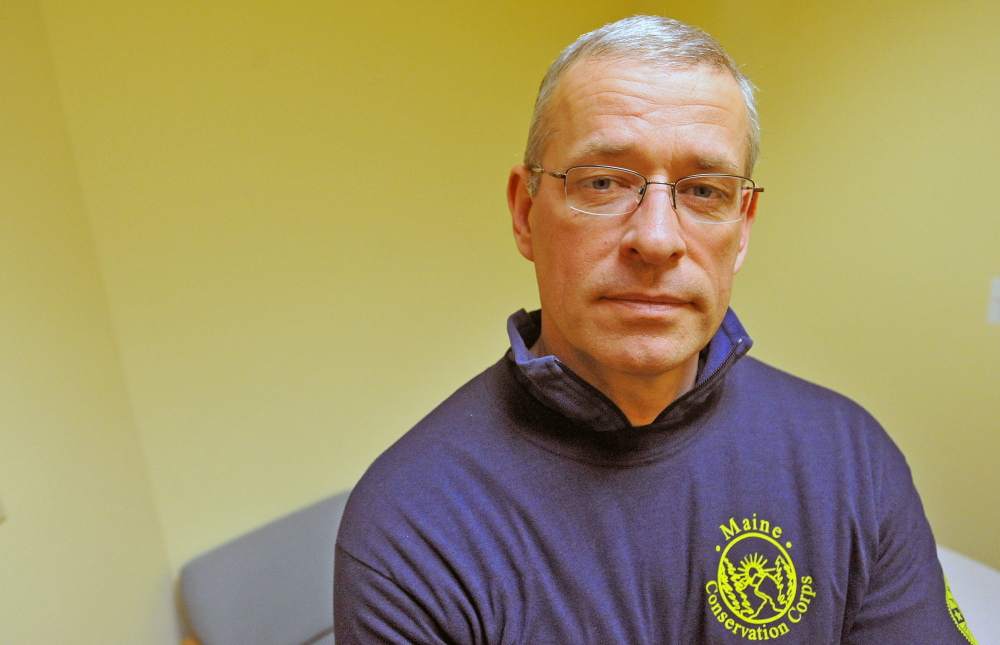Maine Army National Guard member Dylan Cookson loves his job.
The 26-year-old Corinna native said he enjoys leading a tight-knit group of like-minded people as they work together to solve a problem or accomplish a mission that will make the world a better place.
He’s not talking about his career with the military, though.
It’s his time with the Maine Conservation Corps as a Veteran Community Leader, a program that hires military veterans to bring their unique skills to bear in cleaning up rivers, maintaining trails and building canoe launch sites in projects like the Penobscot River Restoration Project.
After a pilot VCL program last year was deemed a success, the corps is training a second batch of veterans to tackle fresh challenges this season. The program is funded with a three-year grant from Americorps that pays six veterans a year about $11,000 to put in 1,700 hours over a 10-month period.
The idea behind the program is to draw on the natural skills of the veterans, who differ from some of the college-age conservation corps workers, according to Krista Rogers, a program coordinator.
“They bring their teamwork skills,” Rogers said. “They already come in with those. Their leadership skills are exemplary.”
At the same time, the veterans, who may be suffering from post-traumatic stress disorder or other problems related to their terms of military service, benefit from working in the woods alongside other veterans as they reintegrate into civilian life. Now, Cookson and his fellow veterans are undergoing a five-day-a-week training period, during which they learn various skills, including how to be an effective fundraiser, chainsaw safety, and designing a trail.
Once they’re done training, a period that lasts several weeks, they’ll be deployed throughout the state, where they will lead groups of volunteers to tackle conservation projects.
Another VCL recruit, James Thomas of Fairfield, said his own term of military service was relatively soft — four years in the Marines, mostly training helicopter pilots in California, with a six-month stint in Okinawa, during a time of peace in the 1980s.
Now, he’s training to work on trails in the Mahoosuc Land Trust in the Bethel area.
The end game for the veterans in the program is often temporary employment in work they enjoy that could lead to future job opportunities in environmental or conservation fields.
Last year, the Veterans Fire Corps paid 278 veterans to construct fire breaks, create slash piles and to respond to active fires. After their time in the program, 229 of those went on to employment with government agencies tasked with protecting the environment, such as the U.S. Forest Service, the National Park Service and the Bureau of Land Management.
“It’s networking,” Thomas said. “You’re meeting a lot of people.”
The Veterans Fire Corps, was formed five years ago by the U.S. Department of the Interior, working with Doe’s organization and the U.S. Department of Agriculture. In 2011, the Forest Service spent $1.5 million to expand the fire corps throughout out much of the West, in part to meet a federal order that directed agencies to help veterans re-enter civilian life and the workforce.
If conservation groups have their way, northeastern states such as Maine will soon have more robust programs, rivaling those in the Southwest.
One national group, the 21st Century Conservation Service Corps, has been working toward a goal of engaging 100,000 young people and veterans in conservation service, a goal supported by 127 member groups from all 50 states.
But the member groups are a long way from that goal, working with about 27,000 people a year.
Cookson and Thomas both said that they hoped the experience they gain will help them make the transition into a career that keeps them working to improve the state’s natural resources.
Cookson said he can relate to his fellow VCLs in a way that he can’t always relate to civilians. For example, with the crew all living together during training, the coordinator would sometimes play the role of a drill sergeant, barking out orders and dishing out rapid-fire insults. It’s the type of horseplay that can bind a group together and let each member know he belongs.
“It’s a great professional experience,” said Cookson. “You’re getting real skills that will get you further in life.”
Matt Hongoltz-Hetling can be contacted at 861-9287 or at:mhhetling@centralmaine.comTwitter: @hh_matt
Send questions/comments to the editors.



Success. Please wait for the page to reload. If the page does not reload within 5 seconds, please refresh the page.
Enter your email and password to access comments.
Hi, to comment on stories you must . This profile is in addition to your subscription and website login.
Already have a commenting profile? .
Invalid username/password.
Please check your email to confirm and complete your registration.
Only subscribers are eligible to post comments. Please subscribe or login first for digital access. Here’s why.
Use the form below to reset your password. When you've submitted your account email, we will send an email with a reset code.